Surely, the South argued, they couldn’t have meant Black people, who, to them, were barely human and absolutely inferior in every way to white men. Hadn’t most of the Founders, Washington, Jefferson, Madison, Hamilton, owned slaves? Religious tolerance was one thing, but freedom and even political rights for Blacks? Never.
I’ve learned that I get far fewer readers when I write long. (If you disagree, click here for my 5,000-word essay on Ronald Reagan.) And so, tough as it is for a president as consequential to American history as Lincoln, I’m going to try to make it brief.
I recently read Jon Meacham’s 2022 book, And There Was Light: Abraham Lincoln and The American Struggle. I am a Meacham fan and have read several of his biographies. Just like with Max Boot on the Reagan biography, Meacham approaches his subject with great care, honesty and nuance. (Rare in our time of biased political and historical tribalism.)
Here's what you need to know about Lincoln’s formative years.
He was born in 1809 in Kentucky. He lived in a few places but most importantly in rural Illinois. Growing up in poverty and on the frontier, he was what we’d call now a “poor white.” He had to work doing hard physical labor. Dad beat him and rented him out for hire to neighbors, taking all his earnings. One could more or less call him something like a familial “indentured servant.” (He referred to himself as a kid as a “slave.”)
Lincoln was an autodidact, self-taught, reading books voraciously from a young age (particularly the Bible), preaching to other kids after sermons, etc. He was tall (he would end up being 6’4 as an adult), athletic, a solid wrestler, and very strong. His mother died when he was nine years old, in 1818. Dad owned several farms upon which Lincoln toiled. As a boy he witnessed slavery and was afraid of and disgusted by it.
He received a brief formal education when young but very little. He was naturally intelligent and read constantly. He hated physical labor. He didn’t like hunting. He craved language and learning. In the late 1820s and early 1830s he fell for several women but things didn’t work out. When it came to the opposite sex he was gangly, awkward and out of his league. Lincoln was much more of an intellectual and an inner man, with rich interior worlds and a love of education. When it came to externals he was generally out of his element when it came to women.
Lincoln left home around age 20/21, about 1829/30. He worked at a general store. He served briefly in the militia during the Black Hawk War. Since his youth he’d had a fascination with politics and he’d read books by such authors as John Stuart Mill, John Bunyan, Daniel Defoe, Hobbes, Lock and others. He also had a light desire to be a lawyer. He was still in formation as a man and thinker and was uncertain of his ultimate career or calling. He ran for Illinois state House of Representatives in 1834—at the age of 25—and won the seat as a Whig (opposing Democrats). Two years later, in 1836, he passed the bar and became a lawyer.
His tenure in the state House of Reps lasted from 1834 to 1842, at which time he met and married, finally, Mary Todd, a woman from a wealthy and connected political family. He ran for and was elected to the United States House of Representatives in 1847 and stayed for one term, ending in 1849.
Since boyhood Lincoln had inherently felt slavery was wrong. Growing up with antislavery parents and steeped in the antislavery rhetoric of the Baptist church, even though he’d been born in a slave state (Kentucky), he felt strongly that not only was slavery wrong morally, but that it would one day (and hopefully soon) have to be dealt with.
And slavery was on everyone’s mind in the 1840s and 1850s in the United States. Since the Declaration of Independence in 1776, there had been uncomfortable tension between North and South in the nation. There could easily have been a civil war right off the bat—even before fighting the British—because the two regions were violently in disagreement on this fundamental issue. What did the Founders mean when they said “all men are created equal”? Surely, the South argued, they couldn’t have meant Black people, who, to them, were barely human and absolutely inferior in every way to white men. Hadn’t most of the Founders, Washington, Jefferson, Madison, Hamilton, owned slaves? Religious tolerance was one thing, but freedom and even political rights for Blacks? Never.
And so, to survive as a unified conglomerate of independent territories (colonies) in the late 18th century, the North compromised with the South and, when they created the Federal Constitution of the United States, they didn’t ban slavery. But the problem never went away. The Northwest Ordinance was established in 1787, in the northern territories, which banned slavery in a large swath of the northern United States. Whigs (and later Republicans) wanted to end the continuation of the Atlantic Slave Trade but understood (or felt) that legally they (the Federal Government) couldn’t actually terminate slavery in individual states. And in fact a new federal law was enacted in 1808 officially “ending” the Atlantic Slave Trade. But this did not stop the south from owning slaves.
The main trouble, then, in the 1830s and 1840s, was when new territories were becoming states. The Major Question of the era was: Would new territories become slave or free states? This question meant everything, because whoever ended up with the majority of states and political representatives would, essentially, direct the path for the nation.
The major river which flowed from these streams was the 1846-1848 Mexican-American War, in which the States, for basically no legitimate cause, fought Mexico and won huge swaths of new land: California, Texas, New Mexico, Utah, Nevada and Arizona, as well as sections of Colorado, Kansas, Wyoming and Oklahoma. (James K. Polk, an imperialist, expansionist Democrat was president during this time.)
Lincoln supported The Wilmot Proviso which failed but would have banned slavery in all the newly acquired Mexican territories. He supported Whig Zachary Taylor who won the presidency in 1848. During these years Lincoln was writing and speaking out against the furthering of slavery. A more radical wing of the Whig party was forming. Lincoln also supported The Compromise of 1850, which allowed California into the union as a free state (non-slave) but strengthened Fugitive Slave Laws (returning escaped slaves who made it to free states).
In 1856 the nascent new radical party called itself the Republican Party. Lincoln strongly backed the new Republican who ran for president, John C. Fremont. Lincoln spoke out vociferously in public supporting the candidate. He started to gain attention from the press and other politicians. He was a powerful, steady speaker. In 1852 the Kansas-Nebraska Act passed by Democrats (Stephen Douglas, Democratic senator from Illinois) which included more huge swaths of land which Democrats wanted to use for the transcontinental railroad; more importantly, Democrats, and particularly Douglas, argued for these lands to be given “popular sovereignty,” aka states’ rights, aka given the ability for each state’s own voters to decide whether to have slavery or not. (Aka to have slavery.) Republicans, and Lincoln, vehemently opposed this idea.
In 1857 the famous Dred Scott case came to the Supreme Court. Scott, a southern slave, had made it to a free state and sued for his freedom. The court ultimately ruled against him claiming that Black people were not American citizens which surely sounded as absurd (to Northerners and abolitionists) then as it does now.
And so the heat was on.
In 1858—Lincoln now almost 50 years old—Republicans decided it was his time for glory. They believed he knew the direction of the party and could take them where they wanted to go. Lincoln reached out to hardcore Democratic pro-slavery senator Stephen Douglas (who was 5’4 to Lincoln’s 6’4) and they hashed it out in a series of public debates about The Slavery Question.
Now, it’s important to understand that Lincoln was not a radical, even if his new Republican party was nominally more radical than the Whigs. Lincoln was still very much a man of his time. Historical context is crucial here. Lincoln still believed that Blacks were essentially inferior to whites. He didn’t argue for Black political rights. He didn’t argue for Black suffrage (the right to vote). He didn’t see Blacks as his equals. He didn’t preach hatred towards white racist southerners. He was flawed, imperfect, and, again, of his time. He was one hundred percent a white man in the mid-19th century.
And yet, he also detested slavery, wanted to end it in the territories which the federal government could do so, and believed that when Jefferson wrote “We find these truths to be self-evident, that all men are created equal,” at least when it came to human bondage, he felt that Blacks were, in fact, on equal footing with whites. They were human men, that was all there was to it. Jefferson and Washington and others—the Founders—had understood that slavery was wrong and should be abolished, even if, contradictorily, they themselves owned slaves and didn’t free them until after they died. But they also understood that to shake the young, early American inchoate nation during their time would have meant civil war and, likely, the end of American democracy (even if that democracy was far from perfect or ideal).
Lincoln—Meacham kept reminding the reader—was not a full abolitionist, nor was he a radical, nor was he an “egalitarian” believing in full political rights for Blacks. He wanted an end to human bondage, period.
~
We all know what happened from there. Lincoln ran for president in 1860, won, and started his term in the spring of 1861. Unfortunately for posterity, in order to garner the needed votes he required, the legislature (not the voters, common practice until well into the 20th century) chose the alcoholic racist Democrat Andrew Johnson as Lincoln’s VP. This was bad in the long run because, after Lincoln was assassinated just after his reelection in 1865, Johnson took power, and he tried to roll back everything Lincoln had done, minus slavery itself. Johnson was the first act in Reconstruction, and it did not speak well for the future. (Thankfully after him came U.S. Grant, who shifted back to Lincoln’s legacy and vision for the post-war nation.)
The period of Lincoln’s presidency was, as we all now know, dangerously fraught. The South was outraged by his win. Lincoln had won with only 39.8% of the vote because it had been divvied up into four candidates: Whigs, Democrats, Republicans and the Constitutional Union Party. Ergo: 60% of the nation did not vote for Lincoln. Not exactly a mandate.
Almost immediately the 11 states of the South—the “Confederacy”—seceded, leaving 18 northern “Union” states. The Confederates fired the first shots at Fort Sumpter, South Carolina, and the nation was at war. The south called it a battle over states’ rights, but Lincoln and Republicans knew it was always over one word: Slavery. States’ rights was code for pro-slavery. (Sometimes states’ rights can be a good and democratic idea; in this case it was not.)
The war was long, harsh and bloody. Some three-quarters of a million men died. One of the bloodiest wars in all history. As the war raged—the Confederacy initially kicked Union ass at Bull Run—Lincoln grew as a man and a president. He’d always had a strong moral compass. He’d always been a man of character. He’d never been a cynical political strategist, even if he did use strategy to win. (Yet he wasn’t the man to abandon his values for the sake of a win.)
He saw on deeper and deeper levels—both moral and political—how wrong slavery truly was. Over time, he came to the understanding that slavery not only needed to be abandoned where it could, but it needed to be abandoned everywhere, all across America. The Confederates, having broken from the Union and starting their own [temporary] Confederate nation, were rebels, traitors, 11 states who had rebelled against common decency.
Lincoln invited people like former-slave and thinker/author Frederick Douglass to the White House. They became friends and seriously discussed The Slavery Question. He met with Sojourner Truth. He read Uncle Tom’s Cabin and other books. Meacham was clear about this: Time and time and time again, Lincoln, who was pulled on one side by his more moderate Republican wing and on the other by radical Republican abolitionists, was given countless opportunities to compromise with the Confederacy on slavery and therefore likely end the war early. Every single time, he refused. Lincoln became firmly, almost diabolically entrenched in the moral rightness of ending slavery.
And of course he was right.
In 1863 he declared the famous Emancipation Proclamation, freeing most slaves, but not all, and offering slave owners financial compensation. In this case he very much was being politically strategic. If he compromised with Confederates he’d anger his radical wing. If he went totally abolitionist-egalitarian he’d anger the moderates. And simultaneously he was trying as best he could to not scare the shit out of the Confederates who, he knew, would eventually have to re-enter the Union. He was attempting the nearly impossible, trying to give everyone a little something but no one everything. This is the game we call politics, and at no other time in American history was it harder than this period.
It was complex, as it always is. Lincoln himself, even into 1864, as well as the majority of white northerners (both in and out of the Union military) still did not see Blacks as equals. For much of the war Blacks weren’t even allowed to fight. Lincoln realized Blacks needed a reason, a motivation to fight for the Union, so after the Emancipation Proclamation, they did. And they contributed heartily. However, even then, in the north, Blacks experienced racism: Separate platoons separate from whites, less pay for the same work, and worse social treatment. Working class whites in the north often even called the war not the Civil War but the N-word War. (One could buy oneself out of the war for $300, precluding the poor and blue-collar folks.)
Lincoln wasn’t a perfect man or president. He suspended Habeas Corpus. He restricted some speech. While never bending over backward to compromise with the Confederacy or the Moderate side of his wing (of which he was a member), he did nonetheless give sway on many levels to the short-term detriment of Black Americans. He did as much as he could using executive action.
In 1865 congress passed Lincoln’s landmark 13th amendment, legally and officially and constitutionally abolishing slavery in the USA. This was perhaps the most important act in all American history after the Declaration of Independence and the formation of the U.S. Constitution. The Civil War might in fact be labeled The Second American Revolution.
~
In 1864 Lincoln won a second term—which was not at all expected—kicking Democrat George B. McClellan’s ass 55% to 45%. It was a landslide. (The Confederacy had elected their own president, Jefferson Davis, in 1861 for a six-year term. Only the north voted for the Union.) There were rumors of rioting on the capital by Confederates and/or those sympathetic to the Southern Cause. Lincoln and his team worried about a riot attempting to stop the electoral voting. It would come down to the VP. Just like Trump and Mike Pence on Jan 6, 2021. (Some of the similarities are startling.)
Eventually—after an exhausting mishmash of wins and defeats and finally after Union wins at Gettysburg, Vicksburg and Georgia—the war was over. The Union had won. Democracy prevailed. Slavery was over. A new day had dawned.
And everyone lived happily ever after.
Just kidding.
~
Though the Union won and Lincoln’s moral vision and ultimately uncompromising stance prevailed, one major event occurred: On April 15, 1865, just after the war ended and after Lincoln’s reelection to a second term, he was shot in the back of the head by actor, white supremacist and Confederate sympathizer John Wilkes Booth. (Booth and another man had intended to kill Lincoln, Secretary of State William H. Seward and VP Andrew Johnson.) The paranoid, radical idea was to create anarchy and allow a vacuum to exist which, in Booth’s mind, would be filled by the Confederacy. His plot ultimately failed, thank God, but he did succeed in murdering Lincoln.
As a result, Johnson became president. He proceeded to undo as many of the Reconstruction ideas Lincoln had pushed. He gave more freedom to the Southern states and helped bring in The Black Codes, legal oppression against newly freed Blacks. (While there were “40 acres and a mule” given to freed Blacks and The Freedmen’s Bureau was created to help freed slaves with housing, medical insurance, etc.) While the northern states were free, the South was technically slave-free but in all other ways still firmly white supremacist. (Grant, after Johnson, would help get the nation back on track.)
Arguably, total and true freedom for Black Americans wouldn’t entirely begin, legally speaking, until a century later, in 1965, after the Voting Rights Act and the end of legal Jim Crow segregation. This will always be a stain on the American consciousness. Though slavery has existed since the dawn of man, and though for millennia race did not necessarily factor into the practice and it occurred globally with all races, and though the West broadly and America specifically only practiced it for about 250 years (compared to thousands of years by nations in Africa, South America, Russia, etc), and though we ended it quite quickly (historically speaking), it is nonetheless one of the nastiest, darkest sides of our national reality. A reality that we still in some more subtle and complex forms live with in society even today.
Lincoln was, as I said, a highly flawed, imperfect man. He was a poor white who grew up disadvantaged…but politically and socially free. Though a man of morality and character, he nevertheless was still a man “of his time.” He didn’t start out seeing Black Americans as equals to whites. He felt deeply uncomfortable seeing them as on the same plane as his own. He sometimes stuck his own foot in his mouth in regards to slavery and Black Americans. And yet, time and again he was given the chance to fold, and he never blinked. He maintained his hard moral vision and he walked where the light led him. He did not waver. He understood the need for political maneuvering and strategizing. Still: In the end he grew into the role of president, and, for some, and for the view of history, somewhat of a prophet.
He did what no other man, no other leader, could have done. He did not yield when it came to corruption, compromise on slavery, or socio-political change. He saw the future. He was like a man standing on a mountain gazing down the valley, knowing what was most likely to come.
Like his moral descendent, MLK, said a century later:
Like anybody, I would like to live a long life. Longevity has its place. But I'm not concerned about that now. I just want to do God's will. And He's allowed me to go up to the mountain. And I've looked over. And I've seen the Promised Land. I may not get there with you. But I want you to know tonight, that we, as a people, will get to the promised land!





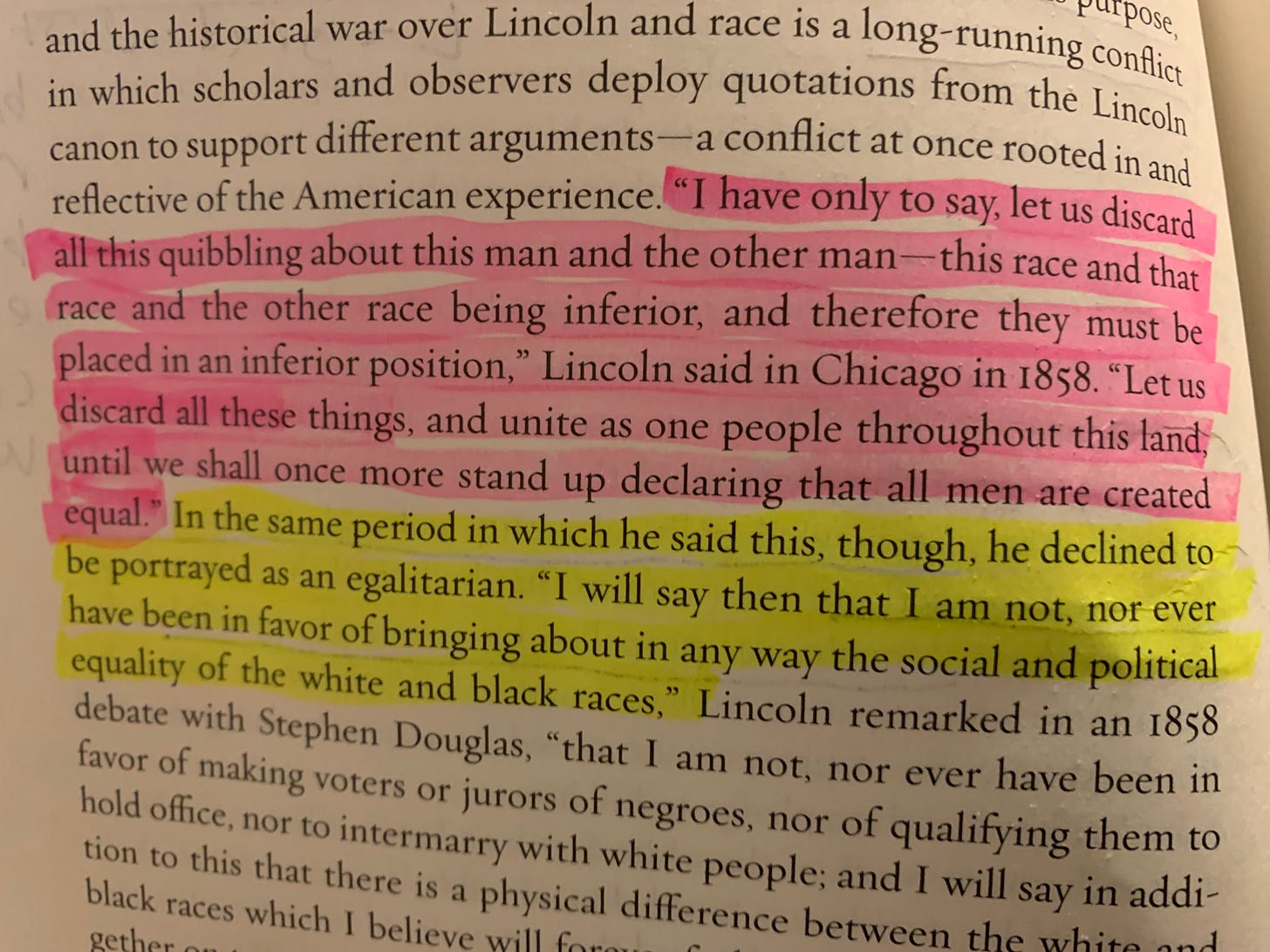

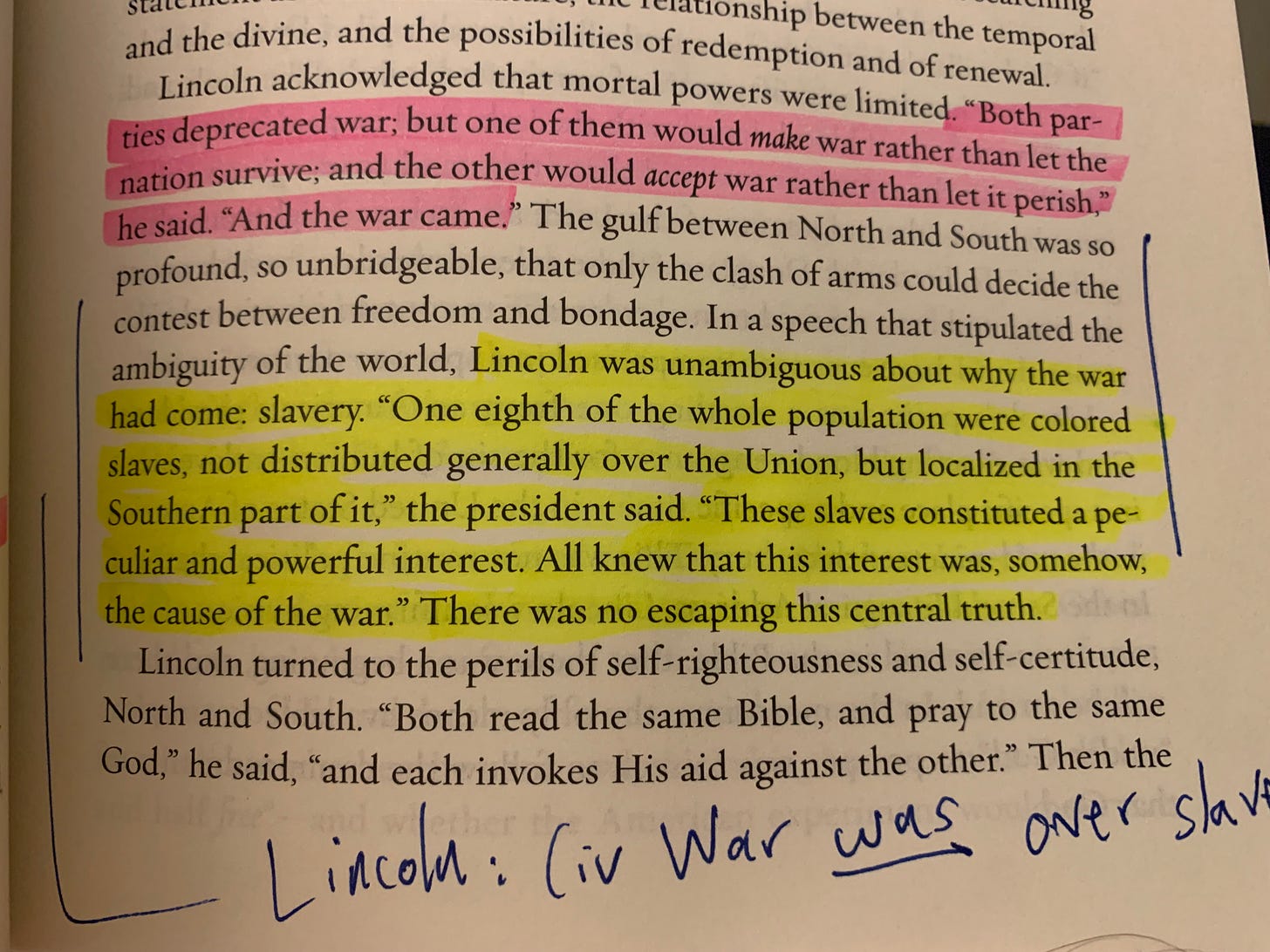

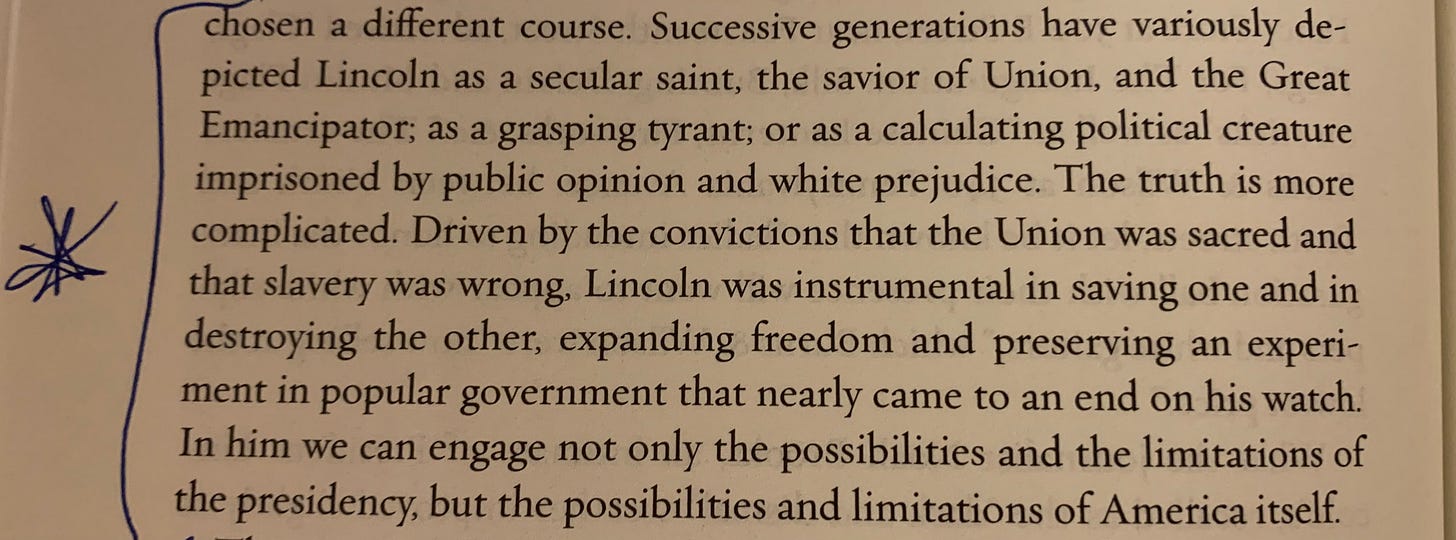
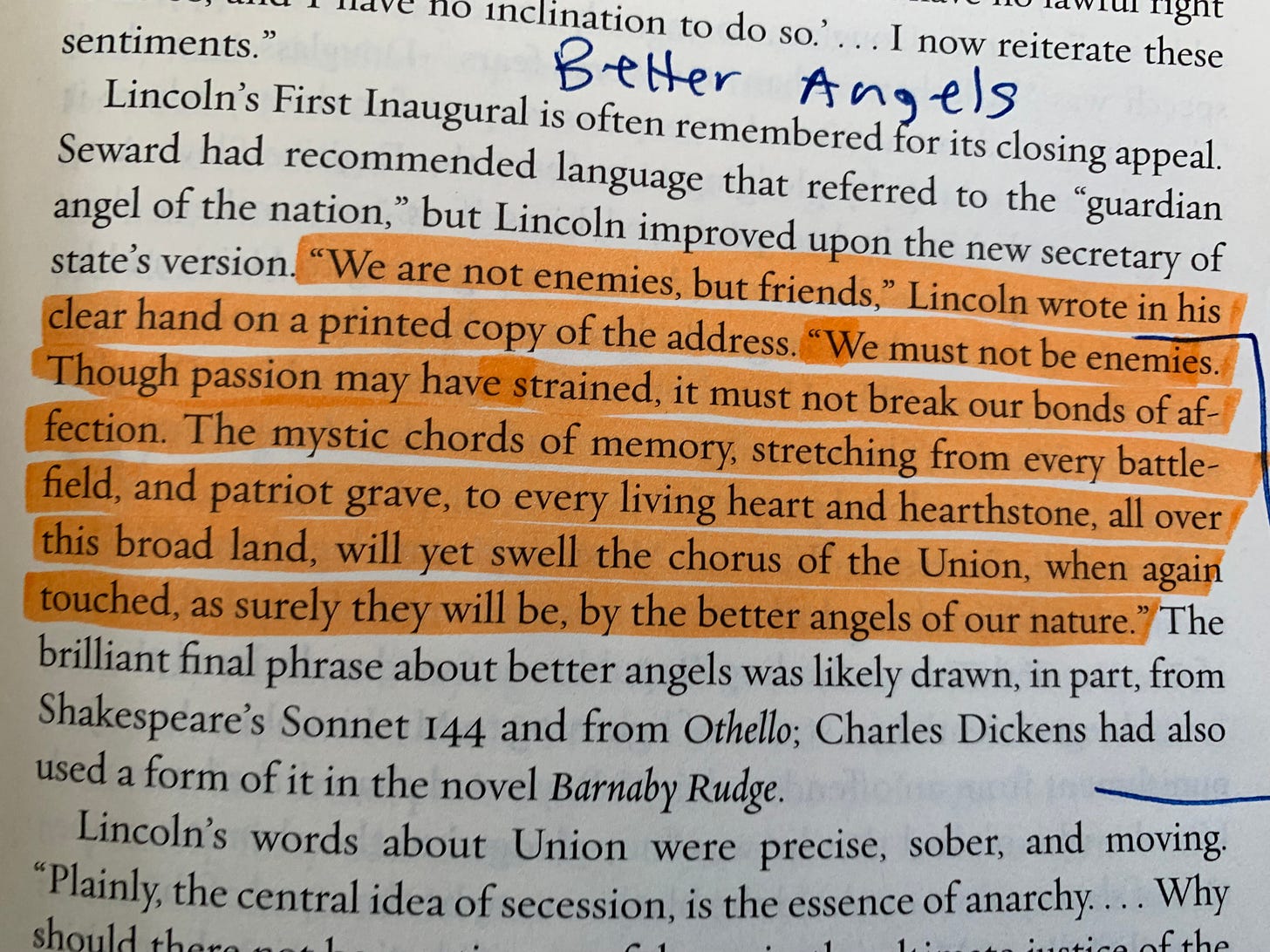
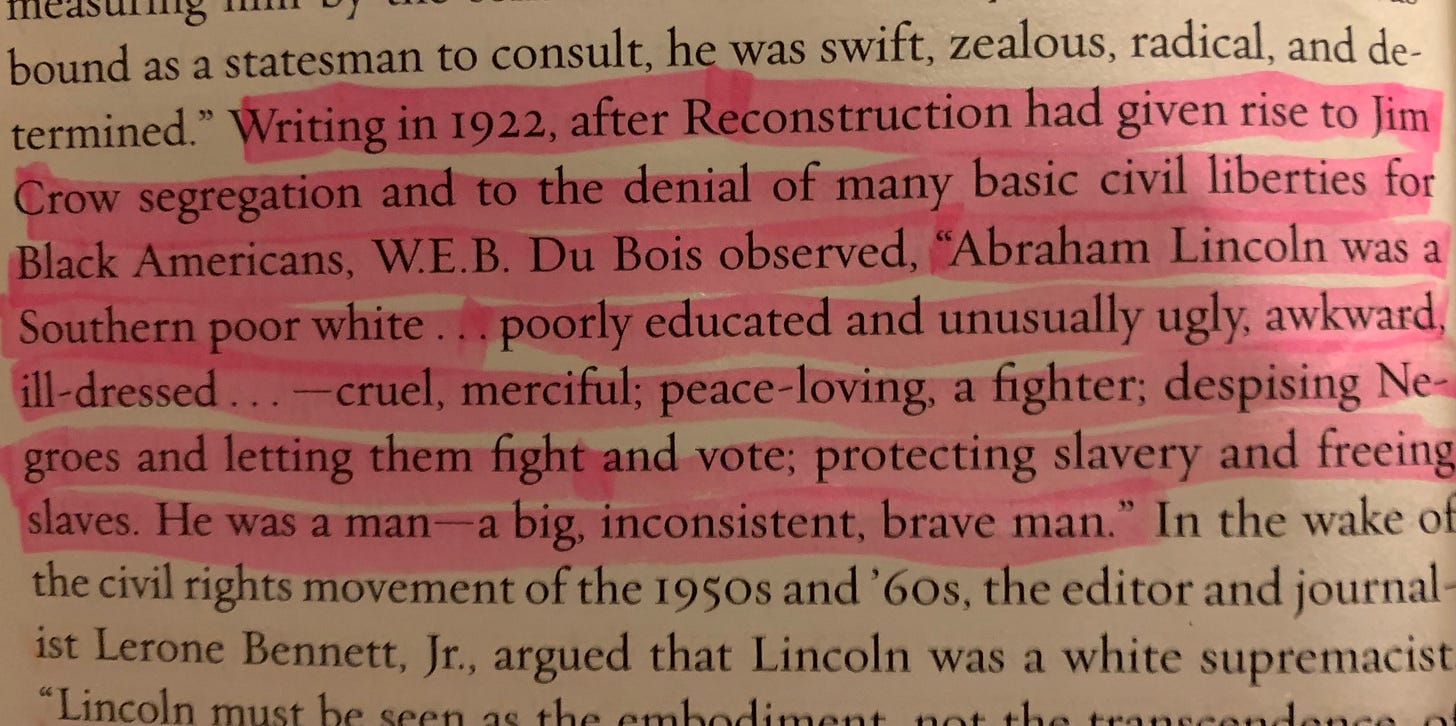
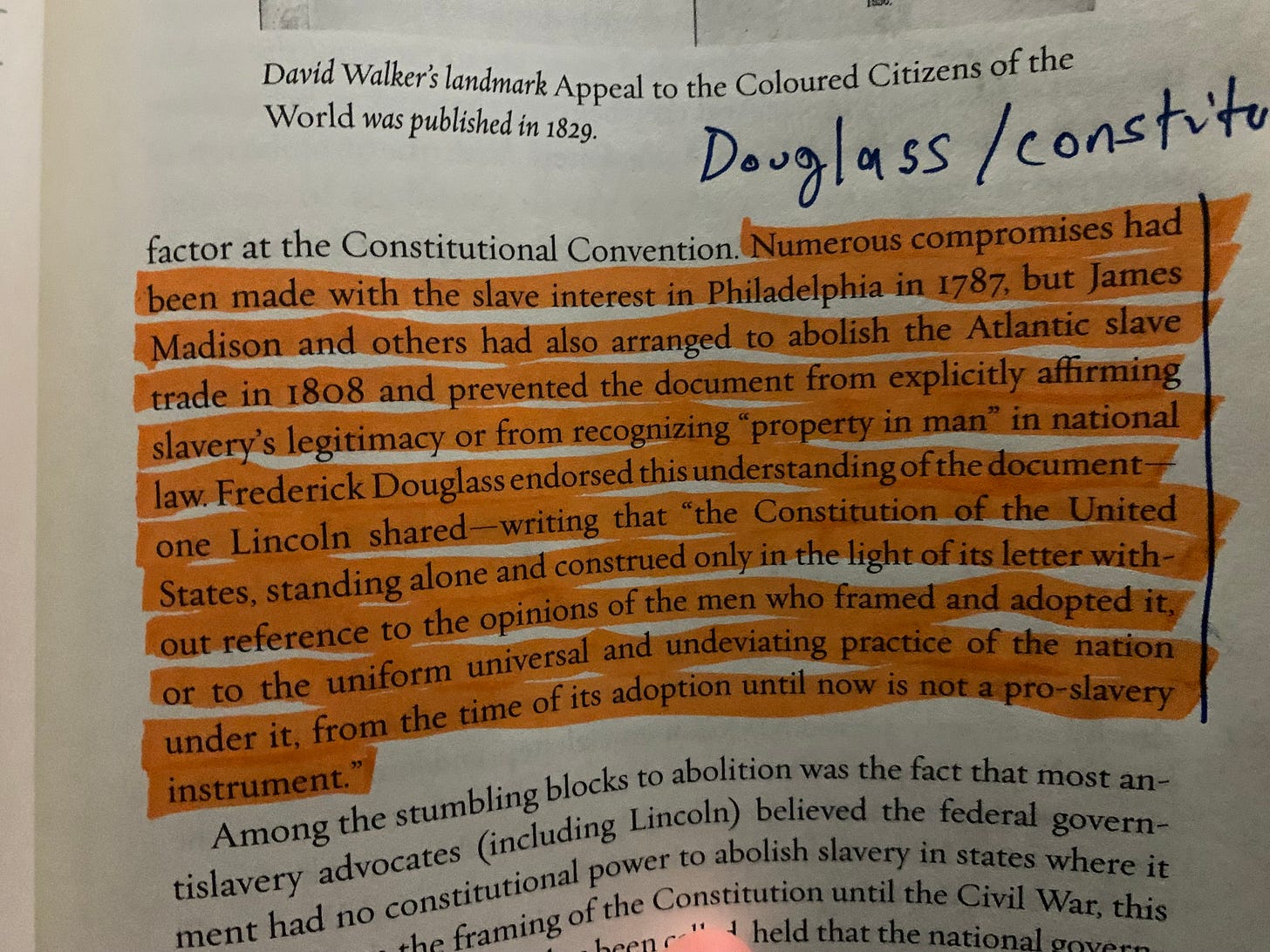
This was a terrific read, Michael. You got a lot of history into a pretty compact post, citing the impeccable work of historian Jon Meacham.